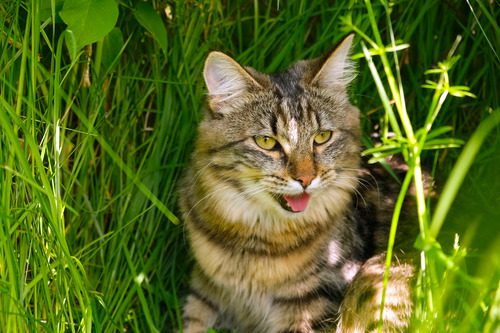Why Is My Cat Breathing Fast?
Cats are known for their calm and composed demeanor, so when a cat starts breathing fast, it can be alarming for pet owners. Rapid breathing, also known as tachypnea, can be a sign of various underlying health issues, ranging from mild to severe. Understanding the reasons behind a cat’s fast breathing is crucial for ensuring their health and well-being. This blog will explore potential causes of rapid breathing in cats, signs to look for, and the importance of seeking veterinary care.

Understanding Cat Breathing Fast
When we refer to a cat breathing fast, it means that the cat’s respiratory rate is higher than normal. Typically, a healthy cat breathes between 20 to 30 times per minute. If your cat is breathing faster than this, it could indicate an underlying issue that needs attention. Several factors can cause a cat to breathe fast, including stress, physical exertion, and various health conditions.
Common Causes of Rapid Breathing in Cats
Respiratory Infections
One of the most common reasons for a cat breathing fast is a respiratory infection. Cats can develop upper respiratory infections (URIs) that affect their nasal passages and lungs, leading to rapid breathing. Symptoms of URIs include sneezing, coughing, nasal discharge, and lethargy. If you suspect your cat has a respiratory infection, it is essential to contact Levan Road Veterinary Hospital at (734) 464-6281 for a thorough examination.
Asthma and Allergies
Feline asthma is another potential cause of rapid breathing in cats. This condition is similar to human asthma and can be triggered by allergens such as pollen, dust, or smoke. Cats with asthma may exhibit symptoms such as wheezing, coughing, and difficulty breathing. Identifying and managing the triggers can help reduce the frequency of asthma attacks. If your cat shows signs of asthma, consult with your veterinarian for appropriate treatment options.
Congestive Heart Failure
Congestive heart failure (CHF) is a serious condition that can cause a cat to breathe fast. In CHF, the heart cannot pump blood effectively, leading to fluid buildup in the lungs (pulmonary edema). This fluid accumulation makes it difficult for the cat to breathe, resulting in rapid, shallow breaths. Other symptoms of CHF include coughing, lethargy, and a swollen abdomen. Early diagnosis and treatment are crucial, so contact Levan Road Veterinary Hospital if you notice these signs in your cat.
Anxiety and Stress
Cats are sensitive creatures, and changes in their environment or routine can cause stress and anxiety. When a cat is stressed, it may start breathing fast as part of the body’s natural response to stress. Common stressors for cats include moving to a new home, the introduction of a new pet, or changes in their daily routine. Providing a calm and stable environment can help reduce your cat’s stress levels and normalize their breathing.
Heatstroke
Heatstroke is a life-threatening condition that can cause a cat to breathe fast. Cats are susceptible to heatstroke, especially during hot weather or if they are left in a confined space without adequate ventilation. Symptoms of heatstroke include rapid breathing, panting, drooling, and lethargy. To prevent heatstroke, ensure your cat has access to cool, shaded areas and plenty of fresh water. If you suspect your cat is experiencing heatstroke, seek immediate veterinary care.
Pain and Trauma
Pain and trauma can also cause a cat to breathe fast. Injuries, fractures, or internal damage can lead to pain, causing rapid breathing as the cat’s body tries to cope with the discomfort. Cats are known to hide their pain well, so look for other signs such as limping, vocalizing, or changes in behavior. If you believe your cat is in pain, contact Levan Road Veterinary Hospital for an evaluation and appropriate pain management.
Age and Breathing Patterns
Kittens and older cats may have different breathing patterns compared to adult cats. Kittens tend to have faster respiratory rates due to their higher metabolism, while senior cats may develop age-related health issues that affect their breathing. Regular veterinary check-ups are essential for monitoring your cat’s health and catching any potential problems early.
The Importance of Veterinary Care
It is crucial not to ignore rapid breathing in cats, as it can be a sign of serious underlying conditions. Always consult with a veterinarian to determine the cause of your cat’s fast breathing and receive appropriate treatment. Levan Road Veterinary Hospital is equipped with the expertise and resources to diagnose and treat respiratory issues in cats. Call (734) 464-6281 to schedule an appointment if you notice any changes in your cat’s breathing.
Monitoring Your Cat’s Breathing
Understanding the reasons behind your cat’s rapid breathing can help you respond promptly and ensure their health and safety. Whether it is due to a respiratory infection, heart condition, asthma, stress, or another factor, seeking veterinary care is essential. By being vigilant and proactive, you can help your cat live a healthy and comfortable life. If you have any concerns about your cat’s breathing, contact Levan Road Veterinary Hospital at (734) 464-6281 for expert advice and care.

